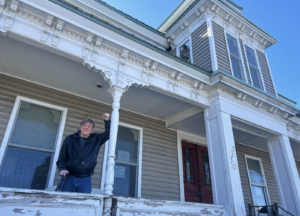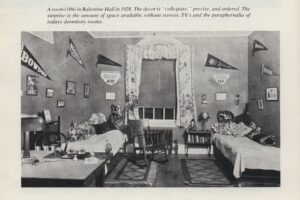Charles McKee is a 38-year-old electrical engineering technology student at the University of Maine who lives on French Island with his wife and two kids. He has previously been a Staff Sergeant in the Air Force and has small business aspirations upon graduation. On Fridays from 4 p.m. to 7 p.m., however, he becomes the Worldmaster of Daggerford, a fictional town in Dungeons and Dragons (D&D), a role-playing game that McKee has played for years and has now turned into a club at UMaine.
McKee describes D&D, a role-playing game based on a series of books, as “collaborative storytelling.” The game is traditionally played like a board game; people sit around a table and roll dice. But McKee doesn’t like to put the game in a box. He says that there are many different versions, but all you really need in order to play is an active imagination.
“We call playing with purely your imagination ‘theatre of the mind.’ You can actually play without character sheets, without any of the books, nothing,” McKee said. “Just purely your imagination.”
Although his group plays a more organized version of the game than ‘theatre of the mind,’ he likes that the game can be played anywhere without needing any equipment.
“It is possible to play without ever having seen the books and just make everything up on the fly,” McKee said. “As long as you have a referee in place, it works.”
UMaine D&D plays a version of the fifth edition of D&D, which is the most recent edition of the game to come out. McKee’s Worldmaster duties primarily consist of “governing the world and making sure that everything stays consistent between adventurers and dungeon masters.” It’s a role McKee relishes in, and his love for the game is visible. He dons an “Ask me about Dungeons and Dragons at UMaine” pin, one of the many ways he gets the word out about the club he started at the beginning of last semester. Recruitment is one of his top priorities and after only five months, McKee says he averages 20-60 people each Friday, some of whom may be visiting from other places.
D&D is usually played with a maximum of eight people, but McKee has had to alter the rules of the game to accommodate the group’s size. In the version McKee’s group plays, characters can come in and out of the adventure, so absences and overcrowding aren’t as much of an issue. This has opened the game up to visitors.
“D&D is a community,” McKee said. “So we’ve had people who are just passing through or only visiting the area come to our meetings because they play and they heard about us. We play a version that’s more flexible in terms of the amount of people who can play.”
The group meets every Friday in Neville 100, and while the meetings start at 4 p.m., the first hour is usually just for socializing and hanging out. At around 5 p.m., McKee, the Worldmaster of the game, starts addressing his constituents. The smattering of conversation that’s going on in Neville 100 starts to slowly die down and the members direct their attention toward the front of the room, where their Worldmaster stands. But instead of just running down a list of club information and upcoming events before getting to the game, as would be typical for a club meeting, McKee takes on a serious topic. He uses the time to teach the club’s members about how to address the reputation and stigma that D&D is often saddled with.
As McKee says, sure there’s the “dungeons and dragons is just a bunch of white guys in their basements prancing around and eating nachos,” a stigma which he quickly refutes by acknowledging the diverse set of members the group boasts. But it goes further than that. McKee proceeds to enlighten the group with more serious examples of people misunderstanding D&D and the people who play it.
“I’ve heard of pamphlets being spread around talking about how (D&D) taught children to learn how to worship demons,” McKee told the club. “There were stories about kids in college who were running around sewers and committing suicide because they thought the game was real or bulls—t like that, which isn’t the case at all. They committed suicide because they were depressed and D&D was one of their few outlets to be social.”
“That’s one of the many uphill battles we’ve been fighting the last 25 years in getting the game out there to people,” McKee said to the group. “When you go out there and someone looks at your button and goes ‘oh hell no’ and walks away, that’s why.”
McKee’s love for D&D goes beyond the University of Maine campus to French Island in Old Town. McKee donates as much time and materials as he can to teaching younger generations about the game he loves, something he says is important for the game’s longevity.
“If you don’t keep the thing going, we’re the last ones,” McKee said. “It’s always that way.”
Still, McKee encounters obstacles because of the way the game can be perceived by the public.
“In just this last year I had a mother ask if I was going to teach her kid how to summon the demons,” McKee said. “I said ‘just an imaginary one. It’s not like anything is going to actually show up because they don’t exist. If you think they’re real there’s something wrong with you.’ She got really mad at me because she obviously thinks they’re real.”
The club is not solely confined to UMaine students. While many members do go to UMaine, others are not in college or they go to other schools in the greater Bangor area. Alex Bickford, a member of the club and a student at Eastern Maine Community College, says the club is a social group at its core.
“A lot of times, people who play D&D and are attracted to it kind of have a niche interest in science fiction things,” Bickford said. “When you’re in a room with 40 people who are all playing it, you have this feeling like ‘well everyone in here is probably into some of the same stuff as I am.’”
Amy Segee, a UMaine graduate student in marine science, also noted the social aspect of the game and describes it as “an excuse to start socializing.”
“It’s a very good opportunity for people who are kind of anti-social simply because if you are a person who has difficulty figuring out social cues or something like that, it’s easier to disassociate yourself just a little bit because you’re playing a character,” Segee said. “Sometimes it’s easier to figure out how a character would react in a situation than it is to say ‘how should I react to this situation?’”
Victoria Sikorski, a first-year engineering physics student, just started playing D&D. She says it has provided a welcoming social group in her first year of college.
“Knowing the D&D world was somewhere that I could be a character and I could pretend to be someone else was very welcoming,” Sikorski said. “It’s very accepting and that’s why I wanted to get into it.”
Beyond the social aspect of the game, McKee points out how valuable he believes the experience will be when he is seeking jobs.
“It is a bullet point on my resume,” McKee said. “It meets two to four times monthly for collaborative team building exercises. What’s more to say?”
McKee has tried to create a culture that is accepting of everyone, and his views are clearly shared by the club’s members. The group has diverse, male and female members, and people from all different walks of life. When it comes down to it, UMaine D&D is just like a sports team or any other type of club. It’s a group of people with a passion for the same thing who get together and do the thing they’re passionate about. That excitement is evident in McKee’s eyes when he talks about his first D&D character.
“I started playing when I was seven? Eight? My first character was a wizard. Actually, no, they didn’t call them wizards then. They called them mages,” McKee said with a nostalgic grin. “I multi-classed him into a fighter mage.”









